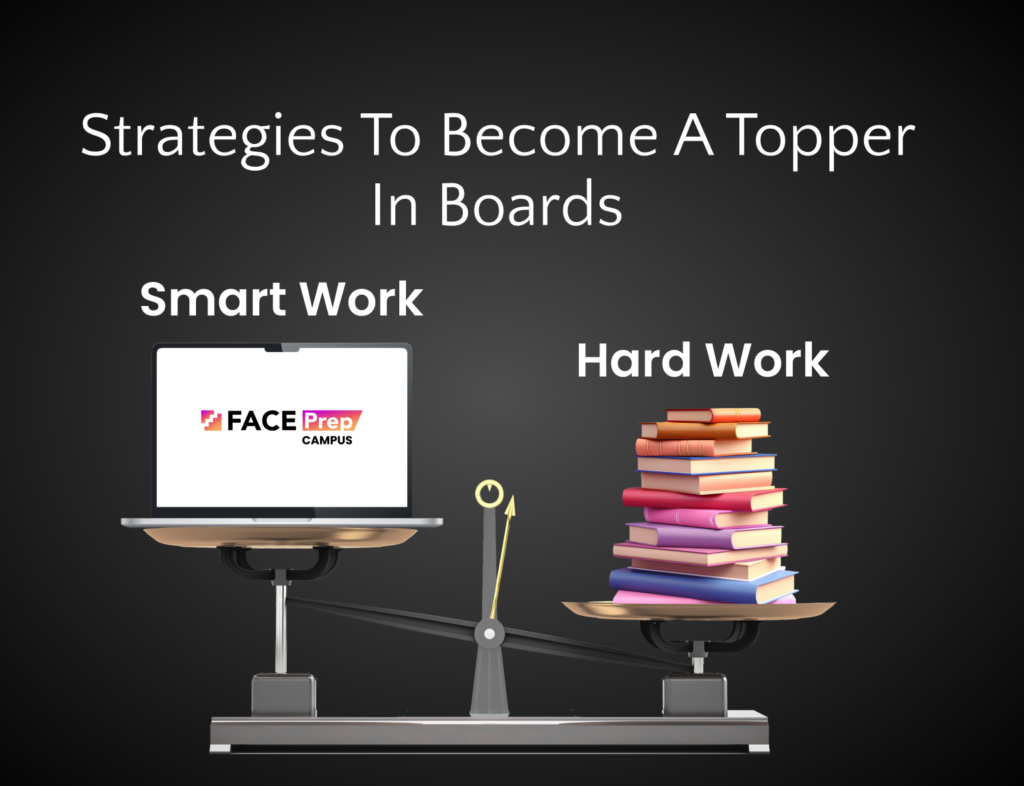Regarding Class 12 board exams, most students believe spending countless hours mugging up lessons is the only way to become a topper. But what if I told you that this is a myth? Yes, the journey of a Class 12 student revolves around this long-held belief, but the truth is simple: smart work is more powerful than hard work.
Toppers are not those who simply study all day. They are students who follow strategic techniques, consistent practice, and well-planned study habits. The good news? Anyone can apply these methods. In this blog, we’ll break the age-old myth that only hard work matters and explore how you can adopt smart study tips to prepare effectively for the Class 12 board exams.
Why Smart Work Beats Hard Work?

Hard work focuses on quantity: studying for long hours, revising endlessly, and pushing yourself until exhaustion. Smart work, on the other hand, emphasises quality—studying with strategy, prioritising key topics, and managing time effectively.
By switching to smart study, you:
- Save precious time and energy.
- Reduce stress and anxiety.
- Understand concepts instead of memorising them.
- Retain knowledge for longer periods.
- Achieve better results with less pressure.
In short, hard work helps, but smart work multiplies the results.
1. Fix a Study Schedule That Suits You
Creating a schedule is the foundation of smart preparation. Instead of blindly following someone else’s timetable, you can design one based on your personality and comfort.
- Know your rhythm: Are you an early bird or a night owl? Study tough subjects like Physics or Maths when your mind is sharp.
- Plan smartly: Keep lighter subjects which are convenient for you (like English or revision work) for later hours.
- Divide your day: Dedicate time to note-making, new learning, revision, and practice.
- Balance breaks: Short breaks between sessions keep your mind fresh and focused.
A structured schedule helps you stay consistent while preventing burnout.
2. Be Consistent: Small Steps Every Day
Consistency is what separates toppers from last-minute crammers. A hurried rush before the exams only creates stress and confusion. Instead, focus on steady preparation.
- Set small daily goals, like finishing one topic.
- Monitor your weekly progress to stay on track.
- Begin early to avoid overwhelming yourself during the final weeks.
Remember: it’s better to study one hour daily for six months than six hours a day for just one month.
3. Set Realistic and Achievable Goals
Goal-setting is an important part of smart work, but it must be practical. Overloading yourself with unrealistic expectations will only lead to stress.
- Instead of aiming for 5 chapters in a day, finish 2 thoroughly.
- Break your goals into daily, weekly, and monthly targets.
- Surround yourself with a positive environment—negative vibes only increase pressure.
- Focus on progress, not perfection.
For example, if you scored 60% in a subject, aim for 70% in the next test. Step-by-step improvement is the true path to success.
4. Maintain Your Physical and Mental Health
A strong mind and body are essential for exam preparation. Without good health, even the best strategies won’t work.
- Get at least 7–8 hours of sleep to refresh your brain.
- Eat a balanced diet to stay energised.
- Take regular breaks—walk, stretch, or listen to music.
- Practice stress-busters like meditation, journaling, or light exercise.
When you are physically active and mentally calm, your focus, memory, and problem-solving skills improve drastically.
5. Devise Subject-Specific Strategies
One common mistake students make is applying the same study method to all subjects. But every subject requires a different approach.
- Mathematics & Physics: Practice problems daily. Focus on solving different types of questions.
- Languages & English: Read carefully, improve grammar, and practice comprehension.
- Biology & Social Sciences: Use flowcharts, diagrams, and keyword-based notes for quick revision.
Identify the subjects where you lose marks and give them extra attention. Customising your study strategy will maximise results.
6. Avoid Distractions: Focus Is Power
Distractions are one of the biggest barriers during exam preparation. Mobile phones, social media, and noisy surroundings consume hours without you realising it.
- Keep your phone away while studying. If needed, use it only for educational apps or videos.
- Choose a quiet, well-lit, and comfortable space to study.
- Surround yourself with people who motivate you, not distract you.
When you minimise distractions, every study session becomes more effective.
7. Practice Previous Year Papers & Mock Tests
Smart preparation is incomplete without practice. Solving previous year papers and sample papers helps you:
- Understand the exam pattern.
- Identify frequently repeated questions.
- Improve speed and accuracy.
- Learn time management during exams.
Set aside time each week to attempt a full-length paper under timed conditions. This builds exam confidence and reduces nervousness.
Final Thoughts: Smart Work Creates Toppers
Toppers aren’t born—they evolve through consistent practice and smart strategies. They don’t spend every minute studying, but they make every study minute count.
To become a topper in Class 12 boards, remember to:
- Plan with a schedule.
- Stay consistent.
- Set realistic goals.
- Protect your health.
- Use subject-wise techniques.
- Avoid distractions.
- Practice with previous papers.
Success in exams isn’t about how long you study, but how wisely you study. Start applying these smart study tips today—and you’ll not just prepare for the boards, you’ll prepare to ace them.
